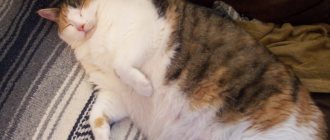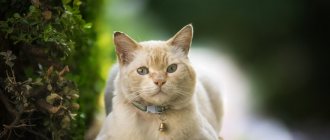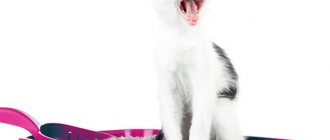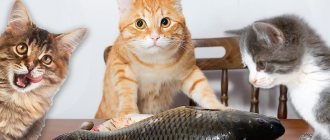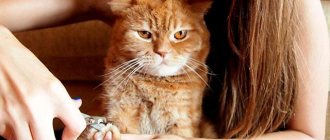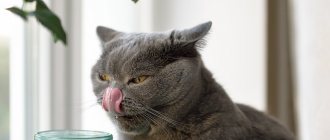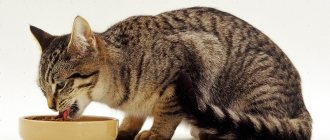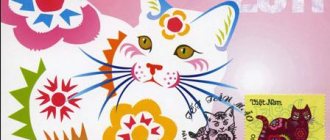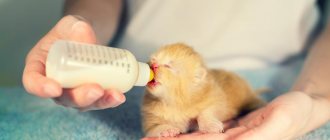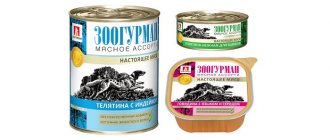Breed Features
Are you planning to get a Bengal cat? Then, before the kitten arrives, we recommend that you learn about the nuances of keeping, care, and characteristics of this breed.
Important! Knowing the characteristics of the breed, you can easily organize a nutrition system, select a diet, and provide proper care for your furry pet.
The Bengal cat is a hybrid breed that was developed through interbreeding (wild and domestic Bengal cats). At the beginning of the formation of this breed, cats of various breeds were used in selection. As a result of painstaking work, modern Bengals have the appearance of wild descendants and the affectionate disposition of domestic cats.
Bengal cats have a muscular, elongated build. Weight is approximately 5-7 kg. The hallmark of this breed can be called the leopard color.
Bengal cats cannot be called very sociable pets. Wild kittens show distrust of humans. At the same time, the descendants of domestic Bengals, although they have a rather independent character, in which the features of wild relatives are visible, with proper socialization and proper care they become attached to members of their family.
Important! Bengals choose only one or at most two owners whom they trust and become attached to.
It is best to adopt kittens at the age of 2.5-3 months. It is necessary to socialize Bengals and instill in them the necessary habits from the first days.
Bengals have a short intestine and a sensitive digestive tract. The breed is prone to food allergies and intestinal disorders.
Cats are often diagnosed with inflammatory gastrointestinal diseases. Therefore, think over your diet long before the Bengal kitten arrives in your home.
How to properly create a menu from natural products?
Bengals digest natural food better. However, creating a balanced menu is quite difficult: it is important to maintain the correct ratio of proteins, fats, carbohydrates and microelements. In addition, this method of feeding does not provide the animal with all the necessary vitamins, so they must be given additionally.
Important!
Keep your dishes clean: a dirty bowl can cause you to refuse to eat.
Despite the difficulties in creating a nutrition plan, natural food has a number of advantages:
- the animal receives a sufficient amount of fluid;
- the risk of diabetes and urolithiasis is reduced;
- life expectancy increases;
- there are no problems with the gastrointestinal tract.
Bengals are descendants of small leopard cats that had no contact with humans until the 20th century. Their diet included rodents, fish, birds, and sometimes even hares. Therefore, the Bengal cat inherited a short intestine designed to digest only meat foods.
Therefore, at least 70% of your domestic carnivore’s menu should be meat. What you can and cannot feed a Bengal cat is described in the table.
| Products | Notes | Can't give | |
| Meat | low-fat varieties: rabbit, chicken, veal, chicken necks. offal: lung, heart, stomach, tripe. | no fat; frozen and scalded; room temperature; chicken necks are ground. 70-80% of the diet | pork, lamb, duck, turkey; bones; minced meat with salt and spices; skin |
| Vegetables | carrots, beets, cucumber, zucchini, bell peppers, pumpkin | raw and cooked; up to 20% of the diet | potatoes, eggplants, legumes, onions, garlic, tomatoes |
| Dairy | kefir, fermented baked milk, cottage cheese, sour cream | up to 20% of the diet | milk, cream for kittens |
| Cereals | buckwheat, oatmeal, cereal flakes | up to 7% of the diet | other crops are not recommended |
| Fish | maritime | boiled, no more than once a week | scales, bones, river fish |
| Eggs | quail, chicken | 1-2 times a week raw yolks | squirrels |
| Greenery | spinach, sprouted grass (oats or wheat), salad | daily | grass from the street |
Important!
Select vitamins for your pet together with your veterinarian. Never give him medications intended for humans.
You can prepare food for future use and freeze it in bags. For example, make this mixture:
- ground chicken fillet - 60%;
- raw or boiled vegetables - 10-15%;
- boiled unsalted rice / other cereals - 5-7%;
- chicken necks twisted in a meat grinder - 25%.
Before feeding, the mixture is defrosted. Add yolk, fish oil (5 ml per 1 kg of food), greens and so on. Try to add variety to the recipe.
How much food to give your pet?
- adult cat: 40-60 cal per 1 kg of body weight per day;
- castrated or sterilized individual: 35-50 cal per 1 kg of weight per day;
- castrated or sterilized animal over 7 years old: 30-45 cal per 1 kg of weight;
- pregnant cat: 60-75 cal per day.
Choosing a place and dishes
For a comfortable life for a Bengal kitten, purchase a cat house, brushes, combs, hygiene and grooming products, trays, and cat dishes from a pet store. Be sure to install a scratching post if you do not want to systematically update furniture upholstery, carpets or furniture. Bengals are small predators with very sharp claws.
The choice of place and dishes is of great importance in keeping Bengal kittens. Bowls for food and food should be wide and comfortable for the pet. You can use a food bowl with several compartments.
Place a large deep bowl for water. Bengals love water very much and are not at all averse to drinking water from the tap. Therefore, in addition to the bowls, you can put a small drinking fountain.
Bowls for food and water can be from:
- glass;
- stainless steel;
- high-quality plastic;
- ceramics;
- clay.
Advice! We do not recommend using aluminum dishes for cats due to the presence of harmful chemical compounds that are released upon contact with food or at high temperatures.
The place where the Bengal kitten will eat should be in a calm, secluded place. During the meal, your pet should not be disturbed or distracted by anything. If other animals live in the house, cat dishes are placed on elevated areas accessible to the cat (cupboard, refrigerator, window sill).
Recommended diet
For Bengals, a mixed diet is optimal: dry food without restrictions on access and, as a supplement, natural products 1-2 times a day.
It is believed that the body produces different enzymes to digest dry and natural food, so be sure to maintain a time interval of at least 2 hours between them. For convenience, create a meal schedule.
If you have a kitten or an unsterilized young animal, then it is necessary to remove the remaining food when the animal leaves it after a meal.
Adult sterilized cats and female cats need a diet without excess calories. Choose specialized series and follow the instructions on the packaging.
For natural food, also follow some rules:
- make the menu varied;
- consider your pet’s taste preferences;
- do not feed cold or hot food;
- meat should always be fresh;
- do not give sweets;
- do not add spices.
If the animal is in good physical shape, looks healthy and well-groomed, then the diet for it is chosen correctly.
What to feed a Bengal kitten
Considering that Bengal cats are direct descendants of wild relatives, many are interested in the question of what to feed a Bengal kitten.
Suitable for feeding Bengals:
- Natural diet, fresh, specially prepared food for your pet.
- Ready-made industrial wet, dry, canned, semi-moist food;
- Combined diet.
Each type of nutrition has its own advantages and disadvantages. When choosing a diet for your Bengal kitten, consider not only your financial capabilities, but also the availability of free time. When creating a menu for a Bengal, do not forget about his taste preferences and age.
Choosing a power plan at home
What to prefer for a Bengal: food, natural products or a combination of them, everyone decides for himself. Veterinarians to this day have not come to a consensus which method is better. You should select a food option based on the cat’s parameters, your time and financial capabilities.
Sample menu by age
The veterinarian or breeder from whom you are purchasing a Bengal kitten will help you create an approximate menu by age. When compiling a diet, take into account age, physical parameters, health status, and living conditions.
Up to a month
For the first four to six weeks of their lives, kittens' main diet is colostrum, the milk of their mother cat. With it, babies receive protective antibodies, nutrients for growth and development.
If a cat refuses to feed her cubs or for some reason the kittens are orphaned, try to find another nursing cat for them as quickly as possible. If this option is not possible, purchase special cat milk substitutes and all the necessary equipment for artificial feeding of kittens from a veterinary pharmacy.
Advice! Whole milk is not suitable for feeding Bengal kittens up to a month old. It is given only in extreme cases. Dilute with water, add one chicken yolk, glucose or sugar. It is best to use goat's milk.
Artificial kittens can also be fed infant formula without sugar or third-party additives. Dilute them with water several times more than indicated in the instructions. At a time, the kitten should eat about 3-5 ml of milk or formula. Feed your pets every two hours around the clock.
1 month
At 1 month, kittens are still fed with mother's milk or, when artificially fed, receive cat's milk substitutes, infant formula purchased in stores or prepared according to special recipes (Tailing's Mixture).
At four weeks you can give your pets their first complementary foods. Boiled minced chicken, chicken fillet, and calcined cottage cheese are given in small quantities.
Kittens are fed every two to three hours. The daily norm is 55-80 ml. When starting complementary feeding, monitor the reaction of the kitten’s body.
2 months
At 2 months, in addition to mother's milk, they can receive a new diet. To feed Bengals, special pates, mousses, and mixtures marked “For kittens” (Royal Canin Babycat Instinctive, Pro Plan JUNIOR) are used.
From natural products, cats are given fermented milk products, low-fat raw meat, scalded with boiling water or boiled meat, whole cow's milk, goat's milk, 10% cream.
Two-month-old Bengals are fed 5-6 times a day. The daily dose of food is 65-95 g. The serving size depends on the speed of growth and development of the kitten.
3 months
At 3 months, a Bengal kitten is fed ready-made food, pates, canned food for kittens, or exclusively natural food. Introduce new foods into your pet’s diet gradually.
The kitten can be given quail and chicken boiled eggs (yolk), raw finely chopped meat (veal, poultry), minced meat, fermented milk products cooked in broth, and cereal milk. Enrich your diet with herbs, stewed vegetables, low-fat baked and boiled fish without bones.
Important! Ask the breeders what they used to feed the kittens. For the first week, feed your pet the same foods, gradually adjusting the diet at your discretion.
Reduce the frequency of feeding, gradually increasing the portion size. The daily norm is 180-260 g. Make sure that the pet is full, but not passed on.
Advice! Whole milk can be completely removed from the diet, as it provokes intestinal upset.
4 – 6 months
Until 6–7 months, a Bengal kitten is actively developing, so the diet should be healthy, nutritious, and fortified.
The best food for Bengal cats
Dry cat food must contain at least 26% protein and 9% fat (veterinary requirements). The intestines of Bengals are very sensitive, so you need to decide on the type of food in the first year of life.
Adult Bengalis painfully endure the transition from a natural type of diet to feeding with prepared foods. Industrial feed should be from well-known super-premium and premium brands. Ideally, it should be holistic food.
We recommend trying:
- WildCat Etosha (Germany) – holistic food;
- CARNILOVE Salmon for Adult Cats – Sensitive & Long Hair (Czech Republic) – holistic;
- Orijen Six Fish Cat (Canada) – holistic food;
- Eukanuba Adult with Chicken (Netherlands) – premium food;
- Royal Canin Bengal Adult (France) – premium class.
WildCat Etosha
Dry grain-free food made in Germany based on natural ingredients. High protein content - 46%, fat - 23%.
Protein composition: chicken, chicken meal, turkey meal, chicken liver. Fats – chicken fat. Does not contain grains or legumes. The source of carbohydrates is flaxseed. The food formula contains a berry-herbal mixture and a complex of vitamins and minerals. Prebiotics MOS and FOS to maintain the balance of microflora in the intestines. Concentrated Jerusalem artichoke squeeze strengthens the immune system. Free from chemicals, preservatives and dyes. Plus feed: high protein content, no grains.
Disadvantage of food: high cost.
Feed price:
- 500 g – 700 rubles (350 UAH);
- 3 kg – 2390 rubles (1195 UAH).
Buy on Zoopassage.
CARNILOVE Salmon for Adult Cats – Sensitive & Long Hair
Food for adult Bengal cats from the Czech manufacturer VAFO PRAHA. Translated, it means the love of a predator. It has a balanced grain-free composition with a high content of crude protein – 36%, crude fat – 17%.
Ingredients: salmon meal, salmon fillet, yellow peas, herring meal, chicken fat, chicken liver, fish oil. Fruits and vegetables: carrots, apples, raspberries, cranberries, blueberries. Hydrolyzed crustacean shells – glucosamine. Chicory root is a source of inulin. Cartilage extract is a source of chondroitin.
The composition contains a complex of medicinal plants, vitamins and minerals. Large, elongated granules help clean the animal’s teeth and oral cavity. Does not contain preservatives or dyes.
Plus feed: does not contain grain and soy.
Disadvantage of food: it is not always available for free sale.
Orijen Six Fish Cat
Fish food with a high percentage of protein – 42%, fat – 20%. Protein composition: salmon, herring, flounder, pike perch, pike, whitefish, pollock (fish of the cod family). Source of carbohydrates: chickpeas, red and green lentils, green peas, alfalfa. Fats – herring oil and salmon oil, canola oil. Vegetables and fruits: pumpkin, apples, spinach, carrots, pears, blueberries, cranberries.
As additives – extracts of medicinal plants. Brown algae - improves digestion and strengthens the immune system. The food is enriched with a vitamin-mineral complex, antioxidants, and probiotics. Contains peppermint.
Plus the food: contains Enterococcus faecium – probiotics that normalize intestinal flora.
Disadvantage of the food: it contains canola oil, a cheap source of vegetable fat.
Prices:
- 340 g – 429 rubles (214 UAH);
- 1.8 kg – 1882 rubles (941 UAH);
- 5.4 kg – 3999 rubles (2000 UAH).
Buy on Zoopassage.
Eukanuba Adult with Chicken
Complete food for adult cats with a high protein content of 41%. Main ingredients: dehydrated poultry, rice, wheat, animal fat, sugar beet pulp, fish oil, dried egg, yeast. Contains a complex of vitamins and minerals. The optimal ratio of Omega-3 and Omega-6 fatty acids supports the health of the coat. Probiotics in the food help improve digestion.
Plus food: optimal protein content for a Bengal cat.
Disadvantage of the food: it contains wheat, you need to control the weight of the animal.
Prices:
- 2 kg – 944 rubles (472 UAH) – buy on Dogeat;
- 10 kg – 4416 rubles (2208 UAH) – buy on Dogeat.
Royal Canin Bengal Adult
Ready-made food for Bengal cats produced in France has a balanced composition and is suitable for cats older than one year. Protein content – 40%, fat – 18%. The optimal ratio of proteins and fats for the Bengal breed maintains muscle mass at the desired level and prevents the development of obesity.
Ingredients: dried poultry meat, wheat, corn gluten, animal fats, rice, fish oil, chicory extract, yeast. Vitamins and microelements: A, D3, copper, iron, iodine, manganese, selenium. Omega-3 and Omega-6 fatty acids have been added.
Plus feed: availability.
Disadvantage of the food: contains corn (allergen).
Prices:
- 400 g – 279 rubles (140 UAH);
- 2 kg – 1119 rubles (560 UAH).
Buy on Zoopassage. Important!
If your pet eats dry food, he needs plenty of fluids. Bengal cats love to drink running water - organize a home fountain for your pet.
Vitamins and supplements
Bengals are given vitamins and supplements only on a natural diet. Veterinarians recommend using complex supplements, nutraceuticals, and biotin complexes. You can also supplement your diet with dry yeast, fish oil, and meat and bone meal. To improve the functioning of the gastrointestinal tract, give probiotics and enzyme supplements.
Vitamin supplements and treats for Bengals:
- Tetravit.
- Trivit.
- Gamavit.
- Beaphar Kittys junior. Gimpet Baby tabs.
- Canina Cat Vitamin (dietary supplement).
Pharmacy vitamin preparations for Bengalis are available in various forms - capsules, tablets, injections, powders, liquids. Your veterinarian will tell you which vitamin complex is right for your kitten.
With a ready-made diet, vitamin complexes are not given. High-quality feed contains all the vitamins, minerals, and amino acids necessary for health and development.
What is needed for content
Care involves choosing the right food, teaching hygiene rules, communicating with owners, and constantly monitoring their health.
What to feed a Bengal cat
For normal development, your pet needs minerals and vitamins. For feeding, you need to buy high-quality dry food, which is sold not in supermarkets, but in specialized zoological stores.
Dry food cares for your pet’s teeth and gums, which is important for the animal’s health.
There are pets who do not like dry food. In this case, the basis of the diet should be wet canned food, which is also purchased at pet stores.
If your pet prefers natural products, it is recommended to consult a veterinarian. He will advise the vitamins that should be given to the Bengal.
It is recommended to sow oats and buy chalk. Kittens chew chalk with pleasure. There are special pastes containing vitamins on sale; you can choose them according to your pet’s taste.
Photo: feeding Bengal kittens
Bengals need water! They, unlike other breeds, not only love to drink water, but also splash in it. If a Bengal gets access to water, for example, while swimming, he simply cannot be pulled away from his favorite activity.
The water bowl should hold at least a liter. Kittens will happily climb into it with their paws and check the water level.
Therefore, in order to prevent wear and tear on the floor covering, it is better to place a bowl of water in a place where spilled water will not affect the floor covering.
Photo: Bengal marbled cat
Many kittens like running water. They love to drink tap water. It should be noted that the Bengal marbled cat is so smart that it can turn on the tap itself, and this is unsafe, because it can flood the neighbors below.
Therefore, when leaving for work, you should not leave the doors to the kitchen or bathroom open.
You can purchase special drinking fountains at the pet store. The sound of water makes cats want to drink water. Cats should drink water; pets who don't drink enough may develop urolithiasis.
Bengal cats are clean animals! They do not tolerate extraneous unpleasant odors, so they neutralize waste by burying them. However, cleanliness is not observed in non-neutered cats - they like to mark their territory.
If keeping Bengals does not involve breeding them, then it is better to castrate the kittens. This will help avoid many troubles.
Photo: beautiful fur is the key to a pet’s health
Diseases
The breed is resistant to diseases, but there are some diseases that are observed in Bengals:
- Inflammatory diseases of the digestive system. Pets experience indigestion, food poisoning, and intestinal diseases. Unfortunately, Bengals have a very sensitive stomach, so food cannot be changed frequently. It is necessary to monitor quality nutrition. Inflammatory bowel disease is not uncommon when keeping Bengal kittens.
- Flat chest syndrome occurs only in small kittens. Due to improper development of the chest, the chest cavity is compressed and the kittens lack air. They are breathing heavily. The syndrome leads to the death of kittens at an early age. If they manage to overcome the disease, then they will develop normally.
- Hypertrophic cardiomyopathy is a congenital heart pathology in which one wall is thicker than the other. Disturbances in the functioning of the cardiac system lead to a lot of health problems, sometimes leading to death. The insidiousness of the disease is that it does not manifest itself at the initial stage, and when the disease is detected, it is not possible to save the kitten. To avoid the development of the disease, it is recommended to regularly do ECG and ultrasound of the heart.
- Weak immune system. The disease is common in kittens that are bred from close relatives. Such kittens need to be regularly vaccinated and dewormed.
Bengal cats are prone to urolithiasis; unsterilized pets suffer from hormonal imbalances.
In old age, the development of cancer is possible. If your pet's diet contains only soft food, the tooth enamel becomes covered with tartar.
You will find the addresses of Bengal cat nurseries in Moscow in the article: breeding Bengal cats.
Read about the size and weight of the Abyssinian cat here.
How to properly care
Bengal cats require a lot of attention. If you don't pay attention to the kitten, they become withdrawn and soon run wild.
When getting a Bengal, you should know that cats are very active and need enough space.
Kittens love to play, so if there are expensive vases or antique objects in the house, it is better to put them in an inaccessible place, otherwise the cat's curiosity may lead to their breakage.
The Bengal leopard cat has short, smooth fur. With proper care, it looks smooth and shiny. The coat is easy to care for. The cat can handle it on its own. But the owner must comb the pet from time to time with a special brush.
Massaging the back and neck of an animal will bring him a lot of pleasure and benefit. It is recommended to wash Bengals only when they are visibly dirty.
Photo: Bengal leopard cat
As for trimming claws, this manipulation should be carried out regularly. The tips of the claws are removed using a special nail clipper. Haircut frequency: once a week. But animals need a scratching post from the moment they move into the house.
If your pet's ears become dirty, wipe them with a cotton swab.
Bengal cats are sociable and curious animals. They examine even the most secluded and inaccessible corner in the house. They like everything, so any thing can become a toy for them.
To avoid property damage, your pet should buy toys. Bengals live on movement, because in the wild they walk tens of kilometers a day.
You can organize your cat's leisure time usefully. To do this, the owner must participate in the game himself. You can make a “fishing rod with rustling prey” and move it, making the Bengal try to catch it. You can play hide and seek with the cat.
Photo: playful kitten
You need to constantly talk to the animal, teach it the commands “you can” and “you can’t.”
Pets choose one owner among all household members and experience great love and affection for him. You can't yell at kittens. This can undermine their trust.
When keeping your pet in an apartment, the safety of your pet is important. Bengals have an irresistible attraction to windows. They need to be looked after like children!
Bengals love heights. You need to create safe places for climbing. You can build a sports complex in which the top shelf will necessarily be under the ceiling.
When the animal begins to play and reaches the top shelf, you can see it as a forest animal inspecting its territory.
Be careful! When walking a Bengal, you should not allow it to swing in the tall grass - the possibility of becoming infected with parasites cannot be ruled out.
Water
At any age, regardless of the type of Bengal diet, drinking water should always be freely available in the bowl. Do not give your cat water from the tap. It contains chlorine and other chemical compounds that are unsafe for animals.
Veterinarians recommend using pre-settled, filtered soft drinking water for kittens to drink. You can also give your kitten bottled artesian water without gas.
Always wash bowls before adding water. The water is changed once or twice every knock. Make sure that there are no food particles, insects, or other third-party particles in it.
It is forbidden!
Fatty meats: pork, duck, goose, turkey, lamb. Pork is especially dangerous for Bengal cats, as it may contain eggs of dangerous parasites that are not destroyed by freezing. River fish - small bones, like bird bones, are not digested, clog the digestive tract, and lead to minor internal injuries. Small bones, especially poultry long bones, can injure the intestines. Sweets in any form are contraindicated, as for all cats. Especially chocolate, which contains theobromine. Spicy, salty and smoked foods cause water-salt imbalance in cats and provoke the development of urolithiasis. Potatoes, due to the starch they contain, are almost completely indigestible and provoke gastrointestinal disorders. Due to the large amount of nitrogen, legumes do not have time to be completely digested and cause increased gas formation and fermentation of the intestinal masses. Spices are contraindicated not only because of the risk of metabolic disorders, but also because of the pungent odor, which can cause pathologies of the sense of smell.
https://youtu.be/bEqk1XE15Mw
What not to feed a Bengal kitten
Not all foods or prepared foods are healthy for furry pets. Therefore, let’s look at what you should not feed a Bengal kitten:
- whole milk;
- legumes;
- fatty meat;
- low-quality by-products;
- raw fish;
- tubular bones;
- baked goods, sweets;
- pasta;
- food category "economy";
- sweet fruits;
- products for adult cats and dogs.
Bengal kittens cannot be given food from our table. Smoked foods, marinades, spicy, spicy, over-salted foods, marinades, garlic, onions, tomatoes, potatoes are prohibited.
Food for Bengals
An animal of this breed can be given Royal Canin.
This is a finished product that already takes into account the dietary habits of Bengalis. Before using wet or dry food for cats of this breed, you need to make sure of its quality. The advertised cheap food is absolutely not suitable. It contains dubious components that can provoke the development of urolithiasis and other ailments. Food for Bengal kittens and adult pets should be premium or super-premium. Top Brands:
- Royal Canin;
- "Hills";
- Acana;
- "Origin";
- "Bosch"
- "Nutra."
Premium or holistic food already contains the necessary beneficial components.
It is important that the cat drinks enough water when the food is ready. The selected food for kittens or adult animals should not be mixed with other food. The advantage of ready-made food is the ability to stock up on it. However, it is important to pay attention to the shelf life after opening the package. Additionally, it is recommended to give your pet canned food from the same manufacturer, containing pieces of meat, stews, and pates.
Baby care
Surely you have already visited the breeder and watched the touching little lumps that sleep next to their mother. And having had a good rest, they begin to play happily, which also causes a lot of delight. However, soon the future owners will bear the full burden of responsibility when Bengal kittens move into their home. What to feed funny babies so that they grow and develop properly, how to protect them from numerous diseases, all these issues can be further discussed with the breeder and veterinarian. Without harm to its own health, the cat will feed the babies only until they reach 1.5 months.
